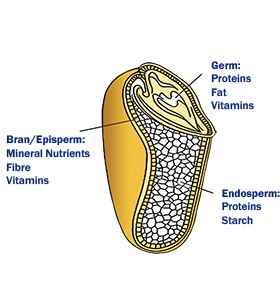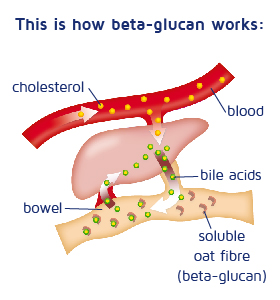

Oats and Nutrition
What’s naturally contained in oats should be preserved. Whereas important parts of the grain (germ and outer edge layers) are removed during milling of most of the bread flours, the whole grain is processed for the production of Kölln oat flakes.
Oats are the most valuable of our domestic types of cereals and contain protein with high biological value, including important amino acids. From a nutritional point of view, the vegetable fats of oats are particularly valuable because they consist of 70% unsaturated fatty acids and 40% thereof are vitally essential linoleic acids.
Moreover, easily digestible carbohydrates and important fibres can be found in oats and Kölln® Wholegrain Oats and Kölln® Wholegrain Oats gluten-free are a source of magnesium, iron, phosphorus, zinc, thiamine (vitamin B1) and beta-glucan.

How can oats have a positive effect on cholesterol levels?
Beta-glucan is a soluble fibre that is characteristic of oats. Beta-glucans contribute to the maintenance of normal blood cholesterol levels.
This beneficial effect is obtained with a daily intake of 3 g of beta-glucans from oats. One serving of Kölln® Wholegrain Oats or Kölln® Wholegrain Oats gluten-free (40 g) already provides 45 % of the recommended daily intake. A varied and balanced diet and a healthy lifestyle are also important.
High cholesterol is one of the risk factors for coronary heart disease.
Coronary heart disease is caused by a number of factors. If one of these is changed, it can have a positive or neutral effect.
Studies show that regular consumption of oat products can lower cholesterol by up to 15 percent after three to six weeks. In addition, the viscous gel formed by beta-glucan also prevents or slows down the absorption of food cholesterol into the small intestine.

How oat beta-glucan works
Among other things, cholesterol is a part of bile acids. A high percentage in beta-glucan binds bile acids in the intestine and activates production of new bile acids from cholesterol in the liver, thus, less cholesterol remains in the blood and the cholesterol level is lowered.
Fibre and pregnancy
Since the intestine makes more and more space for the growing child, it usually becomes more sluggish as the pregnancy progresses. With a diet rich in fibre, digestive problems can easily be dealt with: Wholegrain cereal products such as wholegrain pasta and rice, oat flakes, fruit and vegetables and plenty of drinking.

